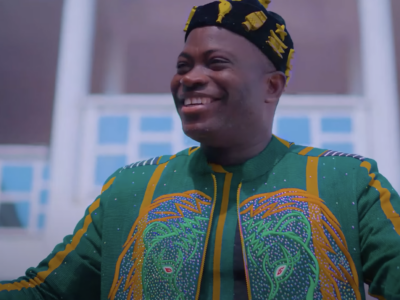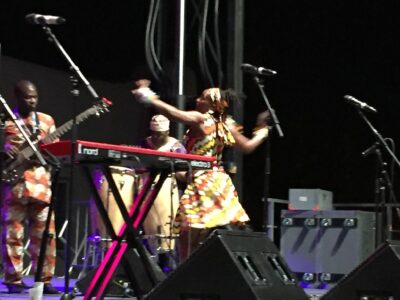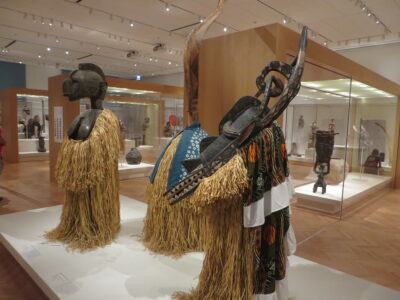
Feel the music! Image by Jan Moons, Africa Film Festival, April 9, 2016. (CC BY-NC-ND 2.0)
African music, with its distinctive emphasis on polyrhythm and beats flowing from percussive instruments, was long treated as subordinate in the international music arena. Music from the continent contrasted the organized sound, instrumentation, and melody which characterized Western music. The distinctive texture in African music is largely due to the cultures that produce the music. Within traditional African societies, music is not to be consumed alone, but is always accompanied by dancing. For within the continent's vast and numerous cultures, music, dance, and rites were all tied to the same cosmic significance — communal living, funerals, marriage celebrations, and festivals.
However, this has changed considerably. African musicians have over the decades persevered in their craft. In so doing, they have not only carried on the distinctive flavors of their forbearers but also expanded and built upon traditional sounds. As music has flowed from the continent to merge with song patterns from other parts of the world, African music and its cultural context has grown beyond the continent.
A journey into African Music is therefore a tribute to the generations of African musicians who influenced the contemporary generation of singers. This series is an acknowledgment of the arduous journey from obscurity to global appeal, acceptance, and significant contributions. In this series, Global Voices will peer into the past in order to understand and appreciate present-day musical phenomena in the continent and beyond.
In order to celebrate and explore these themes, this series will take a look at African music from four main angles. We will discuss the evolution of contemporary music genres, the sampling of music from African greats, the impact of African music on the global stage, and how music is consumed in the continent.
We will explore contemporary music genres that have gained popular validity within the continent and beyond. This will inevitably highlight the evolution of different genres of music within the continent, and include a chronological history of various popular African sounds. Global Voices’ Spotify features a variety of playlists that highlight these fusions and musical evolutions, such as this exploration of African Folk Fusion.
There is no question that there are some legendary musical giants in Africa — artists who influenced generations of artists around the world for decades to come. Musicians, all through history have relied on the music made by their predecessors to create new music. Sampling music is not isolated to the continent. Consequently, this series of posts will interrogate the influence of the older generation on contemporary artists and sounds.
Africa’s musical influence on global sounds will form the third aspect of posts from this series. This includes contemporary musicians who are going back to their roots by taking up traditional musical instruments or rhythms. The impact of incorporating traditional beats and instruments by African artists on building bridges that connects the old to the younger generation. We will also engage contemporary African artists who have collaborated with artists from older generations with great success.
The fourth type of post in this series engages how is music consumed in the continent, in both offline and online spaces. This also includes the state of African music, in a world recovering from COVID-19, the impact of the pandemic on African artists or the music culture in different communities.
A journey in African music was conceptualized by Global Voices Sub-Saharan African editors, Nwachukwu Egbunike and Njeri Wangari. Both, being poets, perfectly understand the need to curate this cultural corpus for posterity. See our article series below.
Stories about A journey into African music
In Azerbaijan, one young queer activist is defying boundaries
Existing legislation in Azerbaijan does not address hate crimes based on gender identity or sexual orientation. There is also no law on bullying despite advocacy efforts of activists.
The complex historical tapestry of media and music in Sudan
Sudan's media has faced political influence and censorship, from radio's promotion of music to state-controlled television and print media challenges. However, private radio stations offer alternative voices, signaling potential progress.
Burkinabe music reflects the country’s openness to globalisation
The music scene in Burkina Faso has evolved to include a blend of Pan-African, diasporic, and international influences, resulting in a diverse array of genres that contribute to its success.
The Rebirth of Rhumba and the musicians who are bringing the sound to a new generation of music lovers
The emergence of a new generation of Rhumba artists from the DRC, Kenya, and Tanzania who are infusing fresh styles into the Rhumba sound is making it more appealing to younger audiences.
In Togo, singer Elias Atayi uses music as a vehicle for human rights
In Togo, the promotion of human rights is not only the work of civil society organizations. Artists also contribute to the cause.
Togolese music scene embraces globalization without abandoning its roots
Rich in musical and linguistic diversity, Togo is embracing the globalization of its music, which is being recognized on a national and international level alike.
Nigerian highlife music scene gets a makeover by two brother duos
Umu Obiligbo maintained the original Igbo highlife style, while the Cavemen have modernized it. Both groups have transformed highlife with an originality that resonates with young people.
How Flavour and Phyno pioneered the revival of Nigeria's Igbo highlife music
Flavour revolutionized highlife by adapting it for dancing in nightclubs and parties. Phyno successfully fused hip-hop and pop into highlife with such finesse.
Celestine Ukwu: the Nigerian philosopher-musician who left his mark on Igbo highlife
Celestine Ukwu’s soulful songs contemplated and portrayed complicated experiences that were deeply rooted in his Igbo identity.
How Nigeria’s Igbo highlife music provided hope after a devastating civil war
The Oriental Brothers provided hope after the civil war. The 80s witnessed the revival of ‘egwu ekpili’. Later, Bright Chimezie’s impressive ‘legwork’ live performances popularized Igbo highlife through the 90s.
The pioneers of Nigeria's Igbo highlife music
Highlife gained popularity in southwestern cosmopolitan Lagos and was transformed in eastern Nigeria. By incorporating Igbo traditional folklore style, they created the Igbo highlife that now enjoys global appeal.
The history of music in Lagos, Nigeria: 1980s to the 2000s
Nightlife disappeared during military dictatorship, with music collectives singing on radio and a cheap imitation of American raps. Currently, individual artists with prodigious talents have revived the music scene.
The history of music in Lagos, Nigeria: from colonial times to the 1970s
Lagos, Nigeria’s cultural capital has always been a cosmopolitan city. A place where music and culture are in constant collision.
Meet the new generation of Kenyan women sparking a vinyl resurgence in Africa
Since music listeners have pivoted toward digital streaming platforms, Maia is one of the few artists who views vinyl records as more than just a novelty.
Africans are changing how they consume music and even taking on international streaming giants
Following global trends, compact disc (CDs) sales on the continent have been on a steady decline as music lovers ditch the discs for digital downloads.
Africa's music scene rebounds after a devastating pandemic
Live performances and music festivals, key revenue sources for African musicians, were annihilated during the COVID-19 pandemic. But things seem to be gradually returning to normal.
Just a Band’s return comes as Kenya redefines its musical identity
Alternative Kenyan music reached new audiences in 2020 as audiences sought a soundtrack that reflected their new upsidedown reality.
World Record Store Day: These Kenyan DJs are keeping the art of vinyl alive in the digital age
Kenya’s vinyl collectors community has reimagined the day they come together to share in the joy of buying, collecting and listening to all manner of Vinyl records.
Protest music: young Nigerian musicians singing against social injustice
Nigerian young singers have continued in that revered tradition of singing against social injustice. The #EndSARS protest triggered their political consciousness, which hitherto, seemed to be experiencing a decline.
The Kuti clan protesting through music, and other Nigerians who sang against apartheid
The Kuti clan have fought tyrannical political leadership through music. Also, Nigerian musicians like Sonny Okosun, Majek Fashek and Onyeka Onwenu fought to release Nelson Mandela from prison.
Africa's heritage restitution debate extends to audio and visual archives
Unlike artifacts whose functionality and value do not depend on the medium they can be accessed through, visual and sound recordings are subject to the vagaries of technology.






















